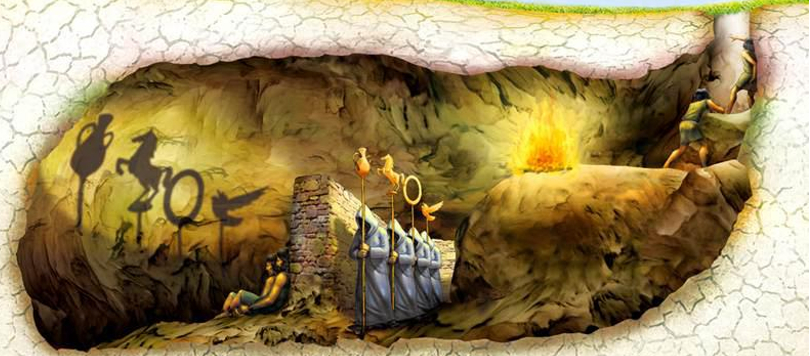Augmented reality and virtual reality are bound to change what we know to be true (if they haven’t already).
In Book VII of The Republic, Plato poses an allegory which describes prisoners who, from birth, have been confined in a cave, viewing the fleeting shadows of various objects cast upon the wall before them by the light of flames behind them. These prisoners have no means of turning around, as their legs and neck are chained. As such, they come to view the shadows as the objects themselves, unaware of the reality that falls behind them.
Read More: The Deep Mind in the Cave: Awakening Consciousness in the Spirit of AI
After one of the prisoners is freed and dares to leave the cave and traverse his new reality, he returns to the cave to share his discoveries with his imprisoned friends. Angered and confused by their former friend’s nonsensical suggestion that the shadows are not actually the true objects, they vow death upon him shall he ever try to free them from the cave.
Through this allegory, Plato was attempting to demonstrate that reality may not be what it seems. What we know to be real may merely be a projection of a separate greater reality.
Over the years, this idea has been popularized by various films such as The Matrix and The Truman Show, to name a couple. In The Matrix, it is explained that the world in which the characters are living “is the world that has been pulled over [their] eyes to blind [them] from the truth.”
With the rapid growth of technology, specifically in regard to virtual reality and augmented reality, the question What is real? is finding itself at the forefront of discussion. Not to mention, with Trump as the President of the United States, there has never been a better time to question our reality…
Read More: Virtual Reality Takes Consciousness Research into Mystic Realms of the Divine Play
Elon Musk, founder of SpaceX, Tesla, and PayPal, has long contemplated this very question and believes the answer is quite simple. During a 2016 interview at Code Conference, he posed the example of Pong – the arcade video game released by Atari in 1972.
Juxtaposing Pong with the 3D realistic, multiplayer simulation games that have spawned since its advent, Musk attempted to illustrate the rapid progress that has been made in this direction. Additionally, if we assume continuous improvement, we will ultimately reach a point at which “the games will become indistinguishable from reality.”
Musk presumes that we have, in fact, already reached this point and that we are almost surely living in a simulation. Neil deGrasse Tyson also regards this as a true possibility, though assigns a probability of 50 percent. With that being said, although some of our brightest minds have supported this theory, others have rejected it as unsubstantiated and misguided.
Read More: New evidence for Holographic Universe backs up ancient esoteric teachings
Assuming for a moment that we are not yet living in a simulation, the question arises: how long until we are? According to a new press release from the International Data Company, annual spending on augmented and virtual reality products will surge from $11.4 billion in 2017 to $215 billion in 2021.
Given many of our current realities (e.g. Venezuela, Syria, Trump…), these figures should not come as a big surprise – people clearly want to perceive a different reality. Additionally, if these numbers and the industry’s accompanying advances are any indication of the timeline to reaching a simulation, that moment does not seem to loom too far away.
Within the past year, we have seen companies taking large strides in the direction of augmented reality and virtual reality. Consider the Pokémon Go craze from last year, or the ubiquitous Snapchat dog filter. We also cannot forget Facebook’s Oculus Rift and HTC’s Vive headsets. (For a list of other recent AR/VR examples, visit the link here.) As is clearly evident, this industry has quickly permeated the crevices of our society, and will likely continue to grow moving forward.
Keeping that in mind, as this industry continues to develop, we can expect changes in what we perceive as reality. Therefore, I urge you not to be the imprisoned cave dweller who opts to kill the messenger, for there will likely come a day when our perception of reality is called into question – and that day may be soon.












